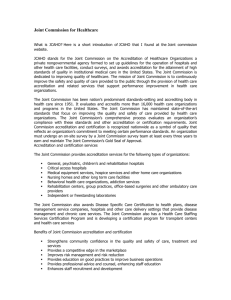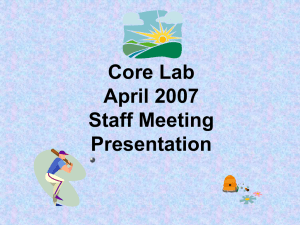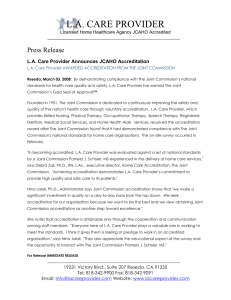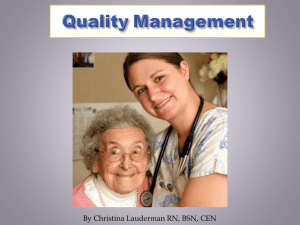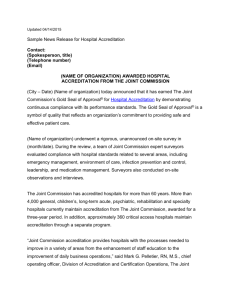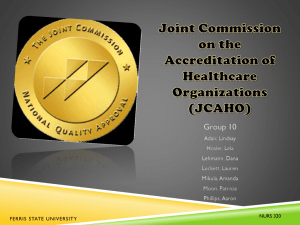JCAHO May Be Subject to Increased Accountability Stacey A. Tovino
advertisement
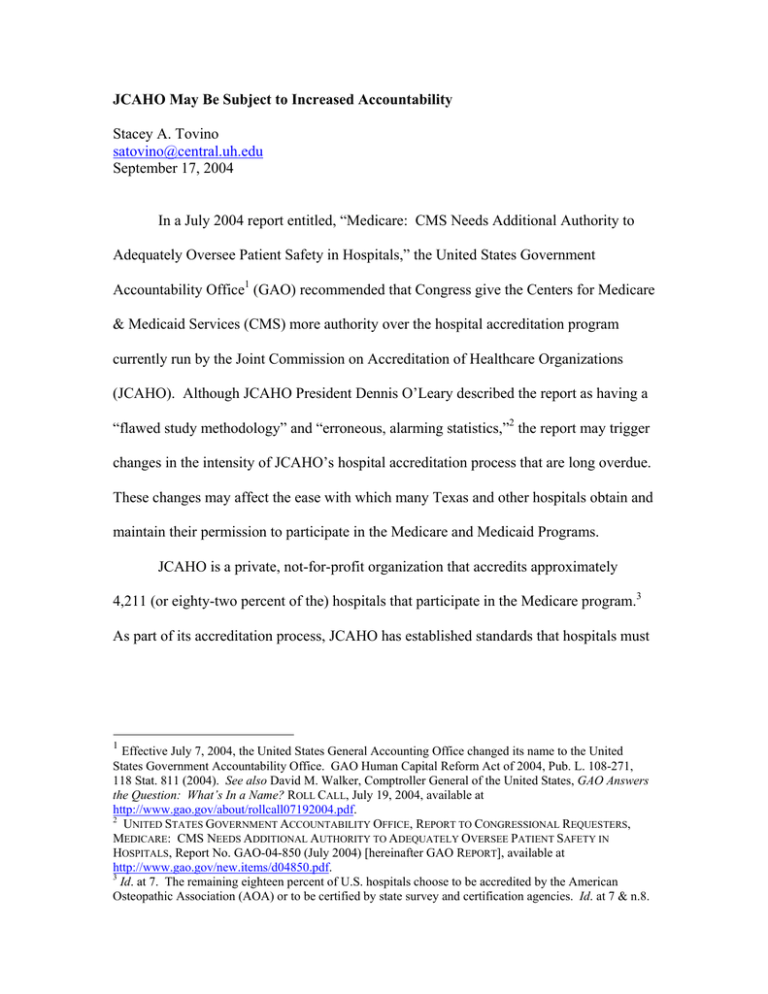
JCAHO May Be Subject to Increased Accountability Stacey A. Tovino satovino@central.uh.edu September 17, 2004 In a July 2004 report entitled, “Medicare: CMS Needs Additional Authority to Adequately Oversee Patient Safety in Hospitals,” the United States Government Accountability Office1 (GAO) recommended that Congress give the Centers for Medicare & Medicaid Services (CMS) more authority over the hospital accreditation program currently run by the Joint Commission on Accreditation of Healthcare Organizations (JCAHO). Although JCAHO President Dennis O’Leary described the report as having a “flawed study methodology” and “erroneous, alarming statistics,”2 the report may trigger changes in the intensity of JCAHO’s hospital accreditation process that are long overdue. These changes may affect the ease with which many Texas and other hospitals obtain and maintain their permission to participate in the Medicare and Medicaid Programs. JCAHO is a private, not-for-profit organization that accredits approximately 4,211 (or eighty-two percent of the) hospitals that participate in the Medicare program.3 As part of its accreditation process, JCAHO has established standards that hospitals must 1 Effective July 7, 2004, the United States General Accounting Office changed its name to the United States Government Accountability Office. GAO Human Capital Reform Act of 2004, Pub. L. 108-271, 118 Stat. 811 (2004). See also David M. Walker, Comptroller General of the United States, GAO Answers the Question: What’s In a Name? ROLL CALL, July 19, 2004, available at http://www.gao.gov/about/rollcall07192004.pdf. 2 UNITED STATES GOVERNMENT ACCOUNTABILITY OFFICE, REPORT TO CONGRESSIONAL REQUESTERS, MEDICARE: CMS NEEDS ADDITIONAL AUTHORITY TO ADEQUATELY OVERSEE PATIENT SAFETY IN HOSPITALS, Report No. GAO-04-850 (July 2004) [hereinafter GAO REPORT], available at http://www.gao.gov/new.items/d04850.pdf. 3 Id. at 7. The remaining eighteen percent of U.S. hospitals choose to be accredited by the American Osteopathic Association (AOA) or to be certified by state survey and certification agencies. Id. at 7 & n.8. meet.4 JCAHO also requires hospitals to satisfactorily complete a triennial on-site survey process.5 For most hospitals, the triennial survey is the only time that JCAHO conducts an on-site review of the hospital’s compliance with JCAHO standards. JCAHO then issues decisions on how well the hospital has complied with such standards.6 Most hospitals that meet JCAHO standards and become JCAHO-accredited are “deemed” to comply with the requirements that hospitals must meet to participate in and receive payment from the Medicaid and Medicare programs, known as the “Conditions of Participation for Hospitals” or “COPs.”7 The original Medicare Act of 1965 granted JCAHO a unique status to deem hospitals as eligible for Medicare payments with virtually no federal oversight.8 Although federal law does require the Secretary of the federal Department of Health and Human Services to “make a continuing study of the operation and administration” of the Medicare Program (including validation of JCAHO’s accreditation process) and to report to Congress on such study on an annual basis,9 CMS cannot restrict or remove JCAHO’s accreditation authority even if CMS discovers problems with the accreditation program.10 Through state survey agencies, CMS does, however, conduct on-site “validation surveys” of a sample of JCAHO-accredited hospitals. The agency that conducts 4 JOINT COMMISSION ON ACCREDITATION OF HEALTHCARE ORGANIZATIONS, HOSPITAL ACCREDITATION STANDARDS (2004). 5 GAO REPORT, supra note 2, at 8. 6 Id. at 8. 7 The Conditions of Participation for Hospitals are codified at 42 C.F.R. Part 482 and are available at http://www.access.gpo.gov/nara/cfr/waisidx_03/42cfr482_03.html. Forty-nine states allow JCAHO hospital accreditation as a full or partial substitute for meeting health care quality standards and other requirements for state licensure. GAO REPORT, supra note 2, at 7 & n.7. 8 Pub. L. No. 89-97, § 102(a), 79 Stat. 286, 315 (1965). 9 42 U.S.C. § 1395ll(b), available at http://www4.law.cornell.edu/uscode/42/1395ll.html. 10 GAO REPORT, supra note 2, at 2. 2 validation surveys in Texas is the Texas Department of State Health Services.11 Several different kinds of validation surveys (including traditional validation surveys, eighteenmonth surveys, and allegation surveys) exist.12 Traditional validation surveys are conducted on a sample of hospitals within sixty days of their triennial JCAHO survey and provide a basis for assessing the effectiveness of JCAHO’s hospital accreditation process. Eighteen-month surveys monitor how well JCAHO-accredited hospitals are complying with the COPs midway between their triennial JCAHO surveys, and allegation surveys are triggered by complaints or other reports of situations that pose potential threats to patient health and safety in JCAHO-accredited hospitals.13 CMS compares the results of the validation surveys against results obtained from JCAHO surveys and issues a “rate of disparity” statistic that summarizes the extent to which JCAHO failed to identify deficiencies identified by CMS validation surveys.14 CMS has the authority to remove the deemed status of a JCAHO-accredited hospital in situations in which a state agency’s validation survey results in a finding that the hospital is out of compliance with one or more COPs.15 Congress charged the GAO with examining: (1) the extent to which JCAHO’s pre-2004 hospital accreditation process was capable of detecting Medicare program deficiencies; (2) whether a new JCAHO hospital accreditation process has the potential to improve JCAHO’s detection of Medicare program deficiencies; and (3) the effectiveness 11 The Texas Department of Health, the agency formerly responsible for conducting validation surveys in Texas, became part of the Texas Department of State Health Services on September 1, 2004. For more information regarding the reorganization of this Texas agency, see http://www.dshs.state.tx.us/. 12 GAO REPORT, supra note 2, at 9. 13 Id. 14 Id. 15 Id. See also 42 C.F.R. § 488.8(e), available at http://a257.g.akamaitech.net/7/257/2422/05dec20031700/edocket.access.gpo.gov/cfr_2003/octqtr/42cfr488. 8.htm. 3 of CMS’s oversight of JCAHO’s hospital accreditation program. In its June 2004 report, the GAO found that JCAHO’s pre-2004 hospital accreditation process failed to identify many of those hospitals that state survey agencies identified as having Medicare program deficiencies. In a sample of 500 JCAHO-accredited hospitals, validation surveys conducted in fiscal years 2000 through 2002 identified 157 hospitals that had Medicare program deficiencies. JCAHO failed to identify seventy-eight percent (or 123) of these hospitals.16 JCAHO also failed to identify the majority (about sixty-nine percent) of serious deficiencies identified by state survey agencies. For example, JCAHO failed to identify the fact that a patient died after receiving a double dose of narcotics in the emergency room of a Texas hospital.17 In January of 2004, JCAHO implemented a new accreditation process that requires, among other things: (1) hospitals to self-assess their compliance with JCAHO’s accreditation standards midway through JCAHO’s regular three-year accreditation cycle; (2) surveyor review of the care provided to specific patients; and (3) beginning in 2006, the performance of all accreditation surveys on an unannounced basis. The GAO found that the potential of JCAHO’s new hospital accreditation process to improve the detection of serious deficiencies was unknown because the process had just been implemented in January 2004.18 Finally, the GAO found that CMS has limited oversight authority over JCAHO’s hospital accreditation program. Unlike other accreditation programs with “deeming” 16 GAO REPORT, supra note 2, at 10. Id. at 15. 18 Id. at 3-5. 17 4 authority, JCAHO does not have to reapply to CMS to reauthorize its authority19 and, thus, CMS cannot take action against JCAHO in order to address performance problems. Accordingly, the GAO concluded that CMS’s existing oversight of JCAHO's hospital accreditation program needs improvement. The GAO recommended that Congress consider giving CMS the same oversight authority over JCAHO’s hospital accreditation program that CMS has for all other health care accreditation programs.20 Although CMS agreed with the GAO’s report, JCAHO did not. JCAHO argued that the GAO’s methodology was incomplete and did not comprehensively assess JCAHO’s overall performance. The report may trigger changes in the intensity of JCAHO’s hospital accreditation process that are long overdue. For almost forty years, the JCAHO triennial accreditation process has failed to identify quality concerns later identified through validation surveys including, but certainly not limited to, inadequate hospital procedures to prevent the spread of infections, inability to assure competent performance of physicians and nurses, and failure to adequately protect patients and staff from fire-related disasters. One logical solution is for Congress to amend the Social Security Act to increase CMS’s oversight of JCAHO. On July 20, 2004, U.S. Representative Pete Stark (D-California) introduced H.R. 4877, which would give CMS the same oversight authority for the accreditation of hospitals that it has for all other health care providers. The stated purpose of the proposed legislation, entitled the “The Medicare Hospital Accreditation Act of 2004,” is “To amend title XVIII of the Social Security Act to revoke the unique ability of the Joint 19 The reapplication process that applies to most other accreditation programs is set forth at 42 C.F.R. § 488.8(f) and is available at http://a257.g.akamaitech.net/7/257/2422/05dec20031700/edocket.access.gpo.gov/cfr_2003/octqtr/42cfr488. 8.htm. 20 See id. 5 Commission for the Accreditation of Healthcare Organizations to deem hospitals to meet certain requirements under the Medicare Program and to provide for greater accountability of the Joint Commission to the Secretary of Health and Human Services.”21 Given that the American Hospital Association and key physician groups appoint approximately seventy percent of JCAHO’s Board of Directors,22 such increased accountability could result in earlier findings of hospital quality deficiencies. 21 H.R. 4877 is available at http://congress.org/congressorg/webreturn/?url=http://thomas.loc.gov/cgibin/query/z?c108:H.R.4877:. 22 Statement of Pete Stark, United States House of Representatives (July 21, 2004), available at http://congress.org/congressorg/webreturn/?url=http://thomas.loc.gov/cgi-bin/query/z?c108:H.R.4877:. 6
